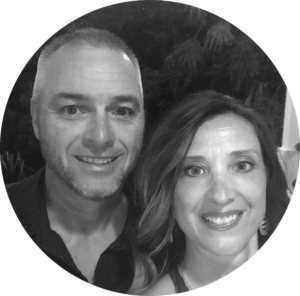Chris Godfredsen was introduced to Faithwalking in the fall of 2014 and has been engaged in the work of Faithwalking through a partner, Churches Learning Change, ever since. He is a Faithwalking Circle leader in NW Iowa, facilitates and coaches Faithwalking Foundations modules, and is deeply committed to the work. Vocationally, Chris is an ordained minister in the Reformed Church in America, working with more than 40 congregations in the areas of church health and multiplication. Chris lives in Rock Valley, IA with his wife, Kathy, and their youngest two children. In all, they have four children, a son-in-law, a granddaughter, and were excited to welcome their second grandchild on September 2nd.
Question: Describe something in your life that you were not aware of before Faithwalking (FW). What was the impact of that lack of awareness in your life?
Answer: I deeply resist being controlled. I did not have language for it before Faithwalking, but I would find myself anxious and overly reactive in meetings when I perceived that someone else in the room was doing or saying something I didn’t agree with. The meaning I would often make in those situations was that their actions were putting me in a box and taking away whatever control I perceived I had in a situation. This resistance to control would also manifest itself in personal relationships and in managing my feelings. What I’ve come to learn is that I am responsible for myself and my feelings, no one else has the power or authority to control me, and it is safe to share my thoughts and feelings.
Q: Tell us about you. Who are you? How did you connect with FW?
A: My given name is Christian, and my last name starts with the letters GOD, and yet I raged against faith in God and Jesus Christ for a good portion of the first 23 years of my life. Gratefully, the grace of God in the person and work of Jesus Christ ransomed my life from certain eternal separation from God and there is nothing I won’t do (short of sinning) to make the name of Jesus known out of gratitude for the life that I was rescued from and now get to live.
I love deeply! I love Jesus with all that I am and all that I have, and I love my wife, children, grandchildren, and friends with that same kind of love. Some of my favorite things are watching my kids compete, riding my bike on the blacktops of NW Iowa, being on the lake with my wife, and watching the Atlanta Braves during the summer time.
God has taken all of my passions, and has also birthed in me a passion for the local church and the pastor. I find it comical, and ironic, that God called me of all people to help build the church, and here’s why. I have long loved the pastor – it was a pastor who discipled me and led me to Christ. And as I spent time with pastors, I heard story after story of people in the church pummeling the pastor. So, for God to call me to grow the church – with church people who used to look down their noses at people like me and who have pummeled their pastors – I both laughed and cried. And I am grateful for the work.
Faithwalking has been an integral tool in leading pastors and members of the churches I am humbled to serve. I came to Faithwalking through a congregational renewal process formerly known as Ridder Church Renewal, named after some donors in the RCA who loved the church, which is now known as Churches Learning Change. Tasked with recruiting congregations to engage in this process, Faithwalking became a tremendous tool to see how I show up in situations and where and why I get stuck and stopped in my ministry, my marriage and relationships. I am not the same person I was when Faithwalking found me and I am [was] really looking forward to having Foundations Modules 1-5 up and running after Labor Day.
Q: What has changed through FW? How are you different?
A: I love this question so much. I would say that virtually everything has changed for me. I have become increasingly self-aware, I continue to grow in living a life that is filled with integrity, and I have guiding principles now driving my life. I have guiding principles for leading meetings, for watching kids’ sporting activities, and have found such freedom from old patterns of behaviors (vows) that led to me being less than God created me to be. I continue to grow in extending compassion to myself and to others when mistakes are made. In Faithwalking, we talk a lot about the True Self and the False Self. In my Truest Self, I am far more curious than I once was, and I genuinely desire to help others move from their patterns of habitual disobedience and into more of who God has created them to be.
Q: Describe the vision you have of your best self.
A: My best self is free of my fears of failure (being thought of or found out to be worthless) and being controlled. My best self can laugh when I make a mistake, doesn’t get angry when others laugh at or make fun of me, and is care-free. This vision is realized when I am clear about my guiding principles and am able to keep my negative vows in the past where they belong.
Q: Describe the vision you have for FW in 5 years.
A: The vision I have for Faithwalking over the next five years is to exponentially grow in order to multiply Faithwalking Circles in all 50 of the United States of America, but to also see its influence continue to grow around the globe. I am grateful that Faithwalking is being offered in a few other countries, but my vision includes seeing it grow and expand into Europe as was as the global south.
Q: What was the most helpful tool you learned in FW?
A: This is a great question. Managing anxiety and taking personal responsibility have been huge for me, but I think I will say that writing out guiding principles have been the most helpful. Honestly, I think all of Faithwalking is summed up in our guiding principles. I can’t manage my anxiety or take responsibility for myself and let other be responsible for themselves without good guiding principles. One of the things I like about this tool is that I can edit my guiding principles if they aren’t working for me. My guiding principles help me to show up in the world as my best self – my Truest Self in Christ. But when I fail, I can go back to them, exercise some self-compassion, and determine if I need to make some adjustments so that I am who and how God created me to be more and more of the time.






